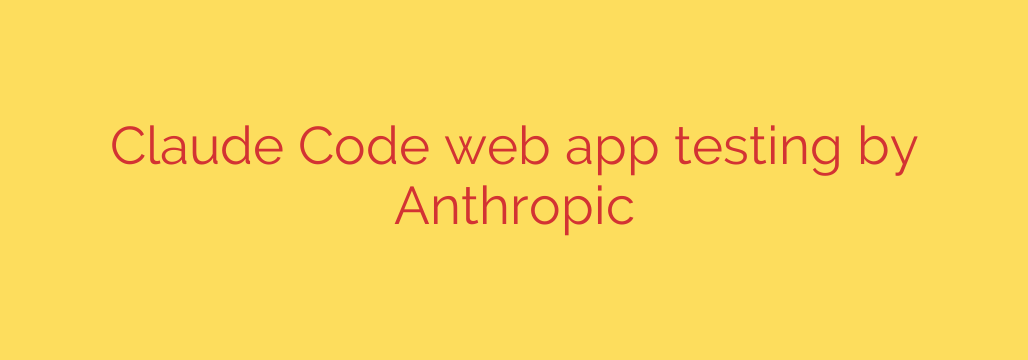
Anthropic Unveils Claude Code: The New AI Assistant for Developers
The landscape of software development is undergoing a seismic shift, driven by the power of artificial intelligence. In this rapidly evolving space, a new and powerful contender has emerged. Anthropic, a leader in AI safety and research, is now testing Claude Code, a sophisticated AI assistant designed to function as a dedicated programming partner for developers.
This new tool aims to redefine developer productivity by integrating seamlessly into the coding workflow, offering support from initial conception to final debugging. It’s built on a foundation of advanced AI, promising not just to write code, but to understand context, solve complex problems, and enhance the quality of software engineering.
Key Capabilities of Claude Code
Claude Code is more than just an autocomplete tool. It’s engineered to be a comprehensive assistant that can handle a wide range of programming tasks with remarkable proficiency. Early testing reveals several standout features that could make it an indispensable asset for individual coders and entire development teams.
Advanced Code Generation: At its core, Claude Code excels at turning natural language descriptions into functional code. Developers can provide a high-level prompt, and the AI will generate clean, efficient, and syntactically correct code snippets, functions, or even entire application frameworks across numerous programming languages.
Intelligent Debugging and Error Analysis: One of the most time-consuming aspects of development is hunting down bugs. Claude Code can analyze blocks of code, identify logical errors or potential issues, and suggest concrete fixes. This goes beyond simple syntax checking, helping to pinpoint subtle flaws that might otherwise take hours to resolve.
In-Depth Code Explanation: Navigating a complex or unfamiliar codebase can be daunting. Users can paste code into the tool and ask for a detailed explanation of its functionality, logic, and architecture. This feature is invaluable for onboarding new team members, learning new languages, or understanding legacy systems.
Optimizing for Performance and Security: The tool is being trained not just to write code that works, but code that is optimized and secure. It can suggest ways to refactor code for better performance, reduce complexity, and identify potential security vulnerabilities before they make it into production.
How It Can Transform Your Workflow
The practical benefits of integrating an AI assistant like Claude Code are substantial. It’s not about replacing developers, but augmenting their skills and freeing them to focus on higher-level problem-solving and innovation.
- Accelerate Development Cycles: By automating the creation of boilerplate code and providing instant solutions to common problems, developers can build, test, and deploy applications faster than ever.
- Improve Code Quality and Consistency: The AI assistant can act as an ever-present code reviewer, helping to enforce best practices and maintain a high standard of quality across a project.
- Lower the Barrier to Entry: Junior developers or those learning a new programming language can use the tool as a powerful learning aid, getting instant feedback and clear explanations to accelerate their understanding.
- Enhance Collaboration: Teams can leverage the tool to quickly understand code written by colleagues, ensuring everyone is on the same page and reducing knowledge silos.
Actionable Security Tips for Using AI Coding Assistants
While tools like Claude Code offer immense power, they must be used responsibly. Adopting AI in your development process requires a mindful approach to security and intellectual property.
- Always Review and Verify Generated Code: Treat AI-generated code as a suggestion from a highly skilled but fallible junior developer. You are ultimately responsible for the code you commit. Thoroughly review it for errors, security flaws, and adherence to your project’s standards.
- Protect Sensitive Information: Never paste confidential data, API keys, passwords, or personally identifiable information (PII) into any AI tool. Ensure that any code shared with the model is sanitized of proprietary or sensitive details.
- Understand Data and Licensing: Be aware of the data the AI was trained on. Generated code may inadvertently resemble existing open-source code with specific licensing requirements. Always ensure your usage complies with all relevant software licenses.
- Use it for Logic, Not for Secrets: Leverage the AI to solve algorithmic problems, refactor logic, or write unit tests. Avoid using it to generate code that handles sensitive authentication or encryption processes without extreme scrutiny from a security expert.
The introduction of Claude Code marks another major step forward in the integration of AI and software engineering. By providing developers with a powerful, context-aware programming partner, Anthropic is setting the stage for a future where creativity and efficiency are amplified, allowing for the creation of more robust and innovative software.
Source: https://www.bleepingcomputer.com/news/artificial-intelligence/anthropic-is-testing-gpt-codex-like-claude-code-web-app/








